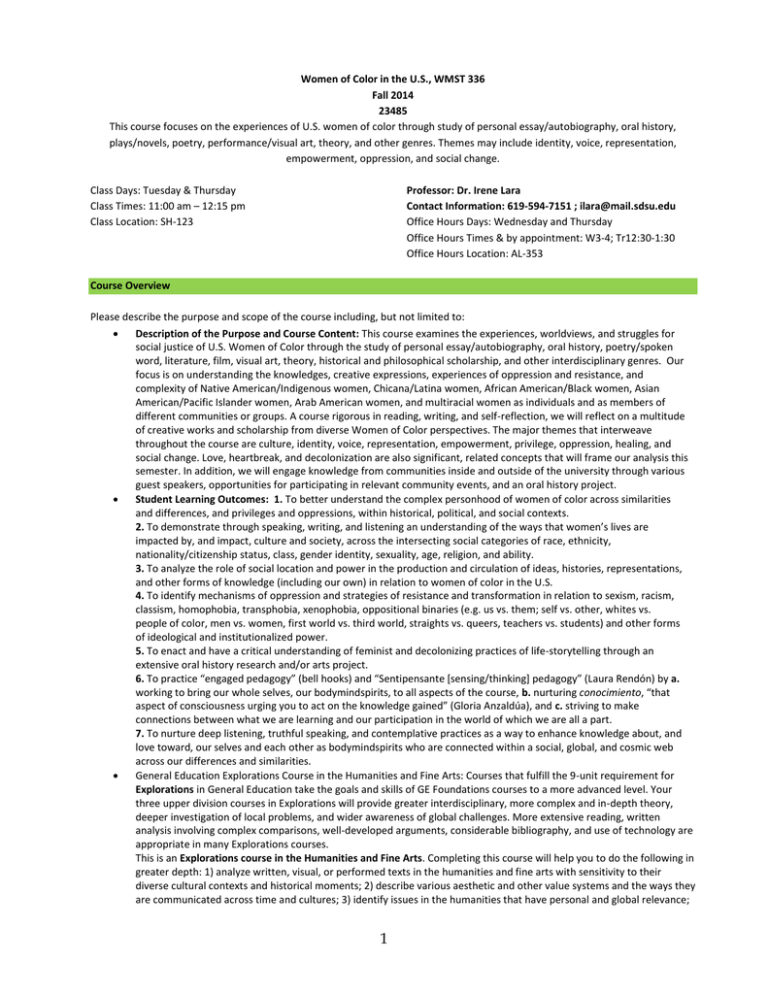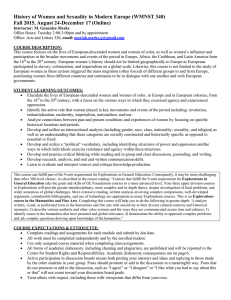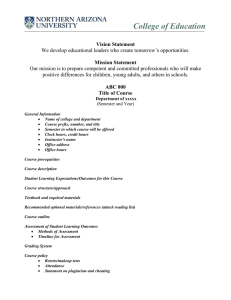Women of Color in the U.S., WMST 336 Fall 2014 23485
advertisement

Women of Color in the U.S., WMST 336 Fall 2014 23485 This course focuses on the experiences of U.S. women of color through study of personal essay/autobiography, oral history, plays/novels, poetry, performance/visual art, theory, and other genres. Themes may include identity, voice, representation, empowerment, oppression, and social change. Class Days: Tuesday & Thursday Class Times: 11:00 am – 12:15 pm Class Location: SH-123 Professor: Dr. Irene Lara Contact Information: 619-594-7151 ; ilara@mail.sdsu.edu Office Hours Days: Wednesday and Thursday Office Hours Times & by appointment: W3-4; Tr12:30-1:30 Office Hours Location: AL-353 Course Overview Please describe the purpose and scope of the course including, but not limited to: Description of the Purpose and Course Content: This course examines the experiences, worldviews, and struggles for social justice of U.S. Women of Color through the study of personal essay/autobiography, oral history, poetry/spoken word, literature, film, visual art, theory, historical and philosophical scholarship, and other interdisciplinary genres. Our focus is on understanding the knowledges, creative expressions, experiences of oppression and resistance, and complexity of Native American/Indigenous women, Chicana/Latina women, African American/Black women, Asian American/Pacific Islander women, Arab American women, and multiracial women as individuals and as members of different communities or groups. A course rigorous in reading, writing, and self-reflection, we will reflect on a multitude of creative works and scholarship from diverse Women of Color perspectives. The major themes that interweave throughout the course are culture, identity, voice, representation, empowerment, privilege, oppression, healing, and social change. Love, heartbreak, and decolonization are also significant, related concepts that will frame our analysis this semester. In addition, we will engage knowledge from communities inside and outside of the university through various guest speakers, opportunities for participating in relevant community events, and an oral history project. Student Learning Outcomes: 1. To better understand the complex personhood of women of color across similarities and differences, and privileges and oppressions, within historical, political, and social contexts. 2. To demonstrate through speaking, writing, and listening an understanding of the ways that women’s lives are impacted by, and impact, culture and society, across the intersecting social categories of race, ethnicity, nationality/citizenship status, class, gender identity, sexuality, age, religion, and ability. 3. To analyze the role of social location and power in the production and circulation of ideas, histories, representations, and other forms of knowledge (including our own) in relation to women of color in the U.S. 4. To identify mechanisms of oppression and strategies of resistance and transformation in relation to sexism, racism, classism, homophobia, transphobia, xenophobia, oppositional binaries (e.g. us vs. them; self vs. other, whites vs. people of color, men vs. women, first world vs. third world, straights vs. queers, teachers vs. students) and other forms of ideological and institutionalized power. 5. To enact and have a critical understanding of feminist and decolonizing practices of life-storytelling through an extensive oral history research and/or arts project. 6. To practice “engaged pedagogy” (bell hooks) and “Sentipensante [sensing/thinking] pedagogy” (Laura Rendón) by a. working to bring our whole selves, our bodymindspirits, to all aspects of the course, b. nurturing conocimiento, “that aspect of consciousness urging you to act on the knowledge gained” (Gloria Anzaldúa), and c. striving to make connections between what we are learning and our participation in the world of which we are all a part. 7. To nurture deep listening, truthful speaking, and contemplative practices as a way to enhance knowledge about, and love toward, our selves and each other as bodymindspirits who are connected within a social, global, and cosmic web across our differences and similarities. General Education Explorations Course in the Humanities and Fine Arts: Courses that fulfill the 9-unit requirement for Explorations in General Education take the goals and skills of GE Foundations courses to a more advanced level. Your three upper division courses in Explorations will provide greater interdisciplinary, more complex and in-depth theory, deeper investigation of local problems, and wider awareness of global challenges. More extensive reading, written analysis involving complex comparisons, well-developed arguments, considerable bibliography, and use of technology are appropriate in many Explorations courses. This is an Explorations course in the Humanities and Fine Arts. Completing this course will help you to do the following in greater depth: 1) analyze written, visual, or performed texts in the humanities and fine arts with sensitivity to their diverse cultural contexts and historical moments; 2) describe various aesthetic and other value systems and the ways they are communicated across time and cultures; 3) identify issues in the humanities that have personal and global relevance; 1 4) demonstrate the ability to approach complex problems and ask complex questions drawing upon knowledge of the humanities. Enrollment Information Please include information about enrollment for the course including, but not limited to: Prerequisites: Completion of the General Education requirement in Foundations of Learning II.C., Humanities required for nonmajors. Adding/Dropping Procedures: Can be added with professor’s permission the first week only. Must be dropped by campuswide drop deadline. Course Materials Required Materials: 1. Anzaldúa, Gloria and AnaLouise Keating, eds. This Bridge We Call Home: Radical Visions for Transformation. New York: Routledge, 2002. (This Bridge We Call Home) 2. Lorde, Audre. Sister Outsider: Essays and Speeches: Trumansburg, N.Y.: Crossing Press, 2007. (Originally published in 1984.) (Sister Outsider) 3. Hernández, Diasy and Bushra Rehman, eds. Colonize This! Young Women of Color on Today’s Feminism. Berkeley, CA: Seal Press, 2002. (Colonize This)! 4. Rojas, Maythee. Women of Color and Feminism. Berkeley, CA: Seal Press, 2009. Options for Accessing Course Materials: Required texts are available at KB Books and at Course Reserves at Love Library Course Structure and Conduct Please provide information about the structure of the course including, but not limited to: Style of the Course: Lecture-Discussion, interspersed with pairs or small group work, in-class writing Individual and Group Activities Required: Individual Project ‘Sentipensante Journals’: Over the course of the semester, you are required to compile a critical reflection journal in which you thoughtfully engage the knowledge communicated through lecture/discussion, guest presentations, the readings, and films. You are to critically engage the material from your bodymindspirit, that is, from your multiple intelligences (e.g. emotional, spiritual, intuitive, and rational intelligences). You will need to purchase a three-ring binder or folder and organize it by section); and Individual ‘Oral History Project’ (OHP): You will also conduct an Oral History Project throughout the semester. You will need to choose a woman of color to spend time with and interview about the topics we are covering in the course. Relevant readings and thorough OHP Guidelines will be covered in the class. Technology Utilized in the Course: Blackboard, Powerpoints, Videos Course Assessment and Grading Please explain how the course will be assessed and graded by including, but not limited to: Approximate Due Dates for any Major Assignments or Exams: Sentipensante Journal I (Sept. 18), II (Oct. 23), and III (Nov. 25). Oral History Proposal (Oct. 16). Oral Presentation and Outline/Write-up (Week 15 or Finals Week). Interview and Transcription (Dec. 16). Final Paper (Dec. 16) Scored activities and weighting by percentage of total score (eg. Exams, Quizzes, Participation, etc.): 1. ATTENDANCE/PARTICIPATION/QUIZZES: 200 points possible 2. SENTIPENSANTE (sensing/thinking) JOURNALS I, II, & III: (100+150+150)= 400 points possible 3. ORAL HISTORY PROJECT: 400 points possible 4. EXTRA CREDIT (not required) 5. WOMEN’S STUDIES COMMUNITY ENGAGEMENT ALTERNATE ASSIGNMENT *total points possible: 1000 Grading Scale: Grades are calculated on a standard scale, with pluses and minuses as appropriate. Late submissions are only allowed for exceptional circumstances and with previous approval from instructor. The Graduate Assistant and I will always make an effort to return assignments within two weeks. Criteria for assigning grades is as follows: A = outstanding, available for highest accomplishments B = praiseworthy, above average 2 C = average, satisfactory performance D = minimally passing, below average F = failing If you are taking the course for credit/no credit, you must earn a “C” to receive credit. If you receive 73% or below you get a “no credit.” The assignment of letter grades for 1000 points is as follows: B+ = 870-890 C+ = 770-790 D+ = 670-690 F = < 600 A = 940-1000 B = 840-860 C = 740-760 D = 640-660 No curves A- = 900-930 B- = 800-830 C- = 700-730 D- = 600-630 *Please note, there may be more or less points possible by the end of the semester. Excused Absence Make-up Policies: You do not need to notify me about the circumstances surrounding your absence in general, unless you have an emergency or special circumstances and would like to request the opportunity to turn in an assignment. If so, proper documentation is required (e.g. signed and dated doctor’s note, towing company bill, memorial flyer). By the end of the second week of classes, students should notify me regarding planned absences for religious observances, athletic competitions, or academic conferences or meetings. If you know you will be absent, submit your work in advance. Other Course Policies Please describe any other course policies important for the class: STATEMENT REGARDING MATURE CONTENT, INCLUDING ABOUT SEX, SEXUALITY, & VIOLENCE: ***Warning Some of the assigned films and/or visual images studied in this course contain graphic violence and/or sexual content, which may be perceived as offensive or disturbing to some viewers. Any students with concerns about this should meet with the instructor at least one week prior to our scheduled viewing of a film or visual images to discuss those concerns. SEEKING HEALING RESOURCES: Throughout the class we may have emotionally intense readings and discussions that address experiences that impact one’s health and wellbeing, such as: violence towards women and girls and racism, homophobia, and other forms of oppression. If you would like to speak further about these issues, I am available during office hours and email and can also refer you to relevant organizations and trained counselors. I have also gathered some local resources for your information and in the service of healing. I encourage you to consult trained counselors at: •SDSU’s Counseling and Psychological Services: 619-594-5220 •Family Justice Center: 619-533-6000 •San Diego Domestic Violence/Sexual Assault 24-hour Hotline: 1-888-DVLINKS or 1-888-385-4657 STUDENTS WITH DISABILITIES: Students who need accommodation of disabilities should contact me privately to discuss specific accommodations for which you have received authorization. If you have a disability, but have not contacted Student Disability Services at 619-594-6473 (Calpulli Center, Third Floor, Suite 3101), please do so before making an appointment to see me. EMERGENCIES: If you have an unexpected emergency and miss turning in a major assignment, you must notify me via email. Documentation of emergency is required. However, there are no make-ups for quizzes. RELIGIOUS OBSERVANCES: Students whose religious obligations will require them to miss class any time this semester should inform the instructor by the end of the second week of classes. Religious observances are the only excused absences allowed. APPEALING A GRADE: You can appeal a grade by using these guidelines: 1. Must be appealed within one week after assignments have been handed back. 2. Must include a typed explanation thoroughly outlining the reason(s) why you think your assignment was not graded properly. 3. Must include the original copy of your graded paper. If you do not feel that the professor’s decision is fair, you can make a meeting with the Women’s Studies Department chair to discuss the issue further. CHEATING & PLAGIARISM: Violations of academic integrity will be reported to the university Disciplinary office. This includes: "recycling” or “borrowing” papers or parts of papers from other courses or students, purchasing papers on-line or from other paper brokers, plagiarizing and other forms of academic dishonesty. Plagiarism will 3 not be tolerated. Do not copy someone else’s work or ideas without giving them credit, and do not summarize someone else’s ideas without giving them credit. Be very careful when researching on the Internet. Always consider the source of the material, and make sure to explicitly cite the website from which you gathered the information. Penalties for plagiarism range from an “F” grade to expulsion from the university. If you have questions about what might be considered plagiarism, please ask. Also see Appendix 2 starting on the next page. See the SDSU General Catalogue for more information at this website: http://coursecat.sdsu.edu/catalog/up.pdf or SDSU’s High Tech Center website: www.sa.sdsu.edu/htc/Plagiarism.pdf CLASSROOM BEHAVIOR: Come to class with your readings, books and/or notes, readings completed, and be prepared to discuss them. Expect that we will cover a wide range of topics and will not always agree on which interpretations are best. But be prepared to defend your point of view. At the same time, whenever you agree or disagree with me or with other students, do so respectfully by drawing on course materials and informed reflections. It is important that you have a desire to participate in this class. You have a choice in the courses you take. The nature of this course demands an engaged and open-minded approach. Your participation is defined as being actively engaged in lectures and class discussion through informed speaking, attentive listening, and taking notes. Courtesy Reminders: *ARRIVE ON TIME; repeatly being late will result in point deductions. *Turn off laptops, internet connections, cell phones, etc. during class. *IT IS DISRESPECTFUL and UNACCEPTABLE to side-talk, read non-class materials, check your phone, text message, and sleep during class. You will be asked to leave and will be docked attendance/participation points. *Do not start getting ready to leave until the class has ended. *Let me know if you MUST leave early or arrive late and, if so, sit close to the door. *Offensive remarks and disrespectful tones and body language are not acceptable and will affect your participation points. LAPTOP USE: Because students sometimes abuse laptop privileges (by doing work unrelated to this class, browsing the Web, checking facebook, etc.) and laptop use creates a cone of distraction extending around a student, using laptops is NOT permitted in the class. If you have a special circumstance that requires use of a laptop please speak to me after class or in office hours to make special arrangements. Cheating and plagiarism are serious offenses. You are plagiarizing or cheating if you: for written work, copy anything from a book, article or website and add or paste it into your paper without using quotation marks and/or without providing the full reference for the quotation, including page number for written work, summarize / paraphrase in your own words ideas you got from a book, article, or the web without providing the full reference for the source (including page number in the humanities) for an oral presentation, copy anything from a book, article, or website and present it orally as if it were your own words. You must summarize and paraphrase in your own words, and bring a list of references in case the professor asks to see it use visuals or graphs you got from a book, article, or website without providing the full reference for the picture or table recycle a paper you wrote for another class turn in the same (or a very similar paper) for two classes purchase or otherwise obtain a paper and turn it in as your own work copy off of a classmate use technology or smuggle in documents to obtain or check information in an exam situation In a research paper, it is always better to include too many references than not enough. When in doubt, always err on the side of caution. If you have too many references it might make your professor smile; if you don’t have enough you might be suspected of plagiarism. If you have any question or uncertainty about what is or is not cheating, it is your responsibility to ask your instructor. Consequences of cheating and plagiarism Consequences are at the instructor’s and the Judicial Procedures Office’s discretion. Instructors are mandated by the CSU system to report the offense to the Judicial Procedures Office. Consequences may include any of the following: failing the assignment failing the class warning probation 4 suspension expulsion 5

